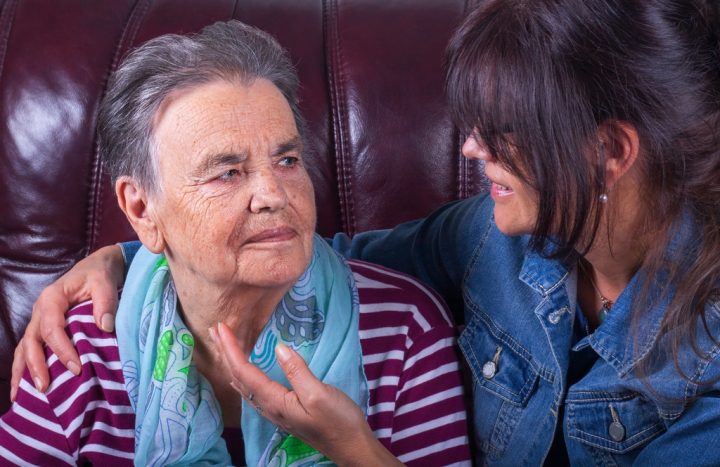Becoming My Mother’s Guardian

It started with a cough that just wouldn’t go away. Many of you probably know what that cough feels like. I don’t. I do, however, know what it feels like to learn that harsh, persistent cough isn’t just allergies or a lingering cold. I know what it feels like to be naïve and protected, and how it feels to have the shield suddenly torn away. And I know what it feels like to pick up the shield and turn it around to protect the one who had always protected me.
When my mom, Holly, became a patient at the University of California, San Francisco, I knew that the cough was pretty serious. In a desperate attempt to preserve my mental health, I refused to let myself do research. For several years, my parents had provided me with only enough detail to be informed, but not totally freaked out, and I kept my promise not to consult Dr. Google. In fact, I had never heard the words “idiopathic pulmonary fibrosis” in that order until I was sitting in a transplant support group down the hall from my mom’s room in the ICU.
In December 2018, following an attack of appendicitis, my mom was staying with her brother in Sacramento. The 6,000-foot elevation of her home in Truckee, California, was no longer comfortable, even with supplemental oxygen. When I video chatted with my parents on Christmas and saw her — white as a sheet, panting despite her oxygen cannula — I knew things were bad. The characteristically hyperbolic, obnoxious anxiety that I’d been trying to smother for weeks had not run me through a rehearsal bad enough to prepare me for reality.
I tried to enjoy Christmas with my little family, but I woke up the next day with compounded dread. My mom went home to Truckee for an appointment with her pulmonologist, and I spent the day trying to convince myself that they would be able to fix her. Late that evening, I got a call from my mom.
It went like this:
“Hey, Mom.”
“Hey, honey, I have something to tell you. You know my lung disease?”
“Yeah?”
“Well, there’s a cure.”
“WHAT?!”
“A lung transplant. It’s pretty drastic but we’re going to go for it. Can you handle that?”
“Yes.”
“Ok, I have to go. They have arranged transport for me to UCSF to start the testing to get on the list.”
She was calm and collected, casual. The real-life, unrehearsed, unshielded version went like this: My mom was flown from Truckee to San Francisco in the middle of the night on a medically supported private plane and was admitted to the ICU because she was about to die. Three hours in a car, or less in an ambulance, wasn’t fast enough.
Though I had peeked into the box in my mind that contained the scary thought, this was the first time the lid came all the way off and the entire, horrible reality was exposed. I began, quite abruptly, to understand that my mother’s disease was terminal.
I hung up and told my husband, Jonny, the news. I was shaking with adrenaline and joy. Two seconds later, I collapsed into sobs. I was suddenly and irreversibly strapped into a ride that I hadn’t known I was even in line for.
I already had booked a flight to visit my parents after the holidays, but each update sharpened my awareness of the situation, and I grew restless. Every day was filled with procedures and tests, each scarier than the last. Innumerable doctors, nurses, and respiratory therapists were working around the clock to stabilize her and tick off the boxes needed to get her on the all-important list.
We soon learned that my mom was going to be in the ICU until she either got a lung transplant or she didn’t. I moved my flight up three days: first thing in the morning, New Year’s Day.
My husband and I stepped outside at midnight on New Year’s Eve and stared at the stars — an unusual sight for Washington in the dead of winter. It was quiet and still. We clinked our glasses and kissed, and then we did something different. We prayed. I didn’t know exactly what I was going to be walking into the next morning, but I knew that I needed all the help I could get to face it.
I needed to find the courage to care for my mom, to walk bravely into this new version of my life and become the one who carries the shield.
***
Note: Pulmonary Fibrosis News is strictly a news and information website about the disease. It does not provide medical advice, diagnosis, or treatment. This content is not intended to be a substitute for professional medical advice, diagnosis, or treatment. Always seek the advice of your physician or other qualified health provider with any questions you may have regarding a medical condition. Never disregard professional medical advice or delay in seeking it because of something you have read on this website. The opinions expressed in this column are not those of Pulmonary Fibrosis News or its parent company, Bionews Services, and are intended to spark discussion about issues pertaining to pulmonary fibrosis.








Sue
A lung transplant is not a cure. If the patient is lucky enough to receive a new lung, The patient will be trading their current Disease for another. It is not an easy journey and there are lifelong medications with the constant threat of rejection. Very touching story though, it brought tears to my eyes.
Christie Patient
You are correct Sue, thank you for mentioning that! To clarify for readers, lung transplant is a "treatment", not a cure. At the moment of the phone call, we did not really know or understand that distinction, but we have learned, and continue to learn new things about my mom's life with new lungs every day.